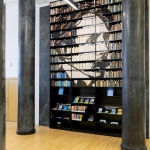

An international project “Digital Approaches in Cultural Heritage: Towards a Pan-Baltic Cooperation Network” carried out in 2018-2019 has come to a close. It was organized by the National Library of Latvia in cooperation with the Martynas Mažvydas National Library of Lithuanian, the University of Rostock, the National Library of Estonia, and the National Library of Sweden.
The main goal of the project was to explore new opportunities for the development of a sustainable international and inter-institutional pan-Baltic region network with the aim of ensuring the use, research and dissemination of cultural heritage.
During the project, four international expert groups analyzed the possibilities for more active involvement and cooperation of the participating countries in using of digital cultural heritage to strengthen regional identity; cross-border accessibility of cultural heritage in digital environment; applying born-digital and digitized cultural heritage; and using of cultural heritage materials in research across borders.
Jolanta Budriūnienė, Head of the Documentary Heritage Research Department at the National Library of Lithuania, led a group of researchers who analyzed the use of digital cultural heritage for strengthening of a regional identity, with a focus on young people’s needs and conditions for exploring, analyzing, and using the artefacts.
The results of this expert group were presented by Budriūnienė at the 17th international conference “Books, Publishing and Libraries” held on 5 July, 2019 at the University of Granada, Spain and at the international scientific seminar organized by Vilnius University on 29 November, 2019.
Besides Budriūnienė, four staff members of the National Library of Lithuania also took part in expert groups: Head of Rare Books and Manuscripts Unit, Dr. Viktorija Vaitkevičiūtė-Verbickienė, chief researcher of the Lithuanian Studies Unit, Dr. Dalia Cidzikaitė, Head of Information Resources Department, Jolita Steponaitienė, and Deputy Director for Development of Information Resources and Services, Sandra Leknickienė.
The findings and recommendations of the expert groups can be found here.
The project was funded by the Council of the Baltic Sea States.



